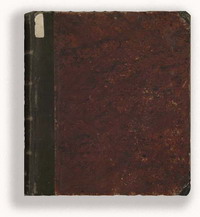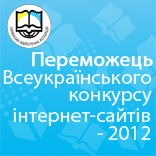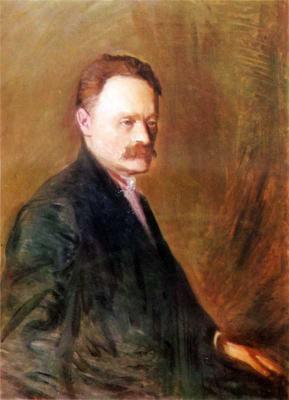Manuscript Albums from the XIX – early XX Centuries
Yet another secret and living proof of a past epoch – a manuscript collection, which contains separate works from the poetic cycle of K. F.
“The Thought”, the poem
“Voynarovski” and an excerpt from an incomplete poem “Nalivayko”. The poems of the poet-decembrist Ryleyev after his death several decades later were disseminated illegally in numerous handwritten copies, as after 1825 his works were not only prohibited but the mention of his name in the press was also prohibited. Notwithstanding the pressures of the czar's censure, the freedom loving motifs of the poet's works excited the educated Russian society. Lines from his poem's were passed on from mouth to mouth and handwritten scripts spread by the hundreds. [3] A visual example of this – our manuscript album. It is necessary to give due credit for the courage of its owner who dared to rewrite such subversive works.

The owner's cardboard binding with leather spine and embossed, unpretentious ornamentation on it envelopes 66 pages of paper with a crest, sewn with hard thread into the notebook. Embossed onto the paper
an oval seal with the monogram of Nicholas I, entwined in a crown and framed in oak and laurel branches. Under the composition is an abbreviation “I.P.B.F.”
The letters refer to the name of the paper manufacturer форзаці (Imperial Peterhoff Paper Factory). On the glued fly sheet made of that paper, is a lyrical poem, handwritten by someone (possibly a man), by an unknown author. It cannot be excluded that it is the poem of one of the owner's or readers of the album:
“Do not ask me any longer
Why I grieve amongst your happiness
Why I gaze harshly upon everything
And why I don't seek bliss or intoxication...”
Sadly, the lines are difficult to sort out since they were covered by a library service label. In addition to that, the script is not very legible. However, it is not this that has the most value in the album. The album opens up
the missive to Bestuzhev from the poem by Ryleyev
“Voynarovski”, and later, in diligent, scholarly script, the entire poem is conscientiously rewritten. The collection continues with elegies that, in their time, were entered into another publication - “Volinsky”, “Nataliya Dovhorukova”, “Bogdan Hmelnytski”, “Dimitri Samozvanets”, and “Artemon Matveev” (the owner's sequencing of notations has been kept). It should be noted that all of the texts were rewritten in their entirety without any abridgements. Concluding the manuscript are the notes that were made in very small, completely formed and conspicuously different from all of the earlier script:

“I heard a death sentence --
My villany's reward
My shame awaits me in a blaze
And a knot will rent my breathing
I will die! And my souless corpse
the abyss on (the sea bottom) will hide
Don't weep farewell over me
The stormy waves will wail.....”
These are the first lines. Before them in the handwriting of the owner is the title, framed in a vignette - “Voice of the Condemned”. Based on the comments [4] to Ryleyev's works, it appears that these are poems of an unidentified author, which were attributed to Ryleyev in error.
On the last two pages, which were left intact (the following ones were torn out), rewritten in that same handwriting is
“Nalivayko's Confession” from the unfinished poem” Nalivayko”.
The final strophes of the fragment very clearly characterize the life and community credo not only of the poet, but quite possibly, of the author of the notations:
“It's known to me, destruction waits”
The one, who first arose against
Oppressors of the people -
Fate has condemned me.
But where, pray tell, and when
Was freedom bought without sacrifices?
I will perish for my homeland
I can feel this, I know....
And happily, this, my holy destiny,
I bless!”
Decorating our album are painted letters in the titles and every so often, unpretentious
stops and endings. Orthographic
errors in the text and the scholastic uncertainty of the caligraphy, with the exception of the last notations, may be evidence that the proprietor (or proprietress) of the album was a very youthful person. The visible differences in the colors of the ink of the written letters are evidence that the notes were made at different times and not by one person.
In conclusion, one may note the correctness of the lines, taken from the epigraph of this section. The manuscript album is truly “a memorial of the soul”.
The outward appearance of the albums and their thematics say quite a bit about their owners: about their inner world, their literary tastes, spiritual disposition, a sketch of their thinking, about their relationships to the surrounding reality, their concern for events that were occurring in society, about their outlook on the community and patriotism.
The defined ideology and thematic direction of our scripts is obvious. Sooner than not, this was not simply a tribute to fashion. This – is a living testimonial to the enormous popularity of the works of the likes of Pushkin and Ryleyev of their contemporaries, a recognition of the importance and genius of the works of prominent poets and a sincere desire to protect all of this for posterity.
Sources:
1. Mihailova, N. “The Album is a Memorial of the Soul.....”// http://www.nasledie-rus.ru/podshivka/8306.php. – Title from the screen
2. Klepikov, S. A. “Filigrees and Seals on the Paper of Russian and Foreign Manufacturers of the XVIII-XX Centuries”; Moscow, 1959, page 283, No. 1235
3. Bazanov, V. I. And Arhipov, A. V. “The Creative Path of Ryleyev”; Ryleyev, K. F. The Complete Collection of Poetry, Leningrad, 1971, pp 5-52.
4. RDLAM f 423, on. 3, ob. zb. 11,12; RSALA – Russian State Archive of Literature and Fine Art
RSALA – Russian State Archive of Literature and Art
 “I heard a death sentence --
“I heard a death sentence --





Comments
Что касается даты (в нашем альбоме), то там стоит 4/7/1820 г., а не 1826 г. На сайте, использовавшем наше фото, некачественное изображение. Дата видна неясно.
Кстати, вот еще любопытные материалы по этому поводу.
http://school.rusarchives.ru/dvizhenie-dekabristov/ryleev-otryvok-iz-poemy-nalivaiko.html
С уважением О. Сак
Тескст стихотворения таков:
Извѣстно мнѣ! Погибель ждетъ
Того, кто пе́рвый возстаетъ
На утѣснителей народа.
Но гдѣ, скажи? Когда была —
Безъ жертвъ искуплена свобода!
Погибну я за Край родной.
Я это чувствую! Я знаю.
И радостно Отецъ святой,
Твой жребій я благословляю!
(подпись автора)
4 июля 1826
http://traditio.wiki/%D0%A1%D1%82%D1%80%D0%BE%D1%84%D0%B8%D0%BA%D0%B0
Вы приводите текст призведения "Исповедь Наливайко".
А абзацем выше речь идет о стихотворении "Голос осужденного", которое ошибочно приписывалось Рылееву. Это были стихи неустановленного автора. (Комментарии к творчеству Рылеева, РГАЛИ, Ф 423, ОП. 3, ЕД. ХР. 11, 12)
С уважением Ольга Сак
Очень интересная статья. Надо зайти к Вам - посмотреть эти сокровища!
Ждем с нетерпением! Всегда будем рады!
Музей книги
Одно удовольствие - читать рукописные альбомы русских людей XIX века - знаменитых и безвестных. Это наше национальное достояние, как и "большая" литература.
Вы совершенно правы, уважаемый Матвей, рукописные документы прошлых столетий, к числу которых можно отнести и наши альбомы, действительно являются национальным достоянием, культурным памятником ушедшей эпохи. И наша задача не только обеспечить их сохранность, но и широко популяризировать их. Что мы и делаем. Отрадно, что Вы понимаете это и разделяете наше мнение.
Музей книги